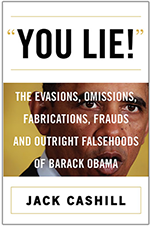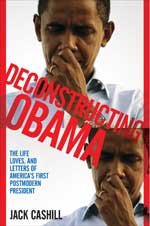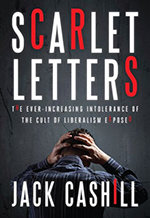The Antidote to Destructive Black Rage
Order Jack Cashill's newest book,
Scarlet Letters
___
Get your copy of Jack Cashill's book, "You Lie!"

___
Get your copy of Deconstructing Obama

___
Jack Cashill's book:
Hoodwinked: How Intellectual Hucksters have Hijacked American Culture
© Jack Cashill
WND.com - November 25, 2015
In the fifty or so years the left has been dictating the rules of racial etiquette, the life chances of the average black person have cratered and race relations, if recent campus rumbles are any indication, have collapsed.
Seven years ago, millions of white Americans voted for Barack Obama in the hope of reversing this trend, but by design Obama has only aggravated it. Progressives, after all, progress. It’s in their nature.
Even in progressive circles, especially in progressive circles, eggshells surround people of color. Individual black people may not want them there, but black spokespeople insist they be there.
As a result, whites approach minorities, especially blacks, gingerly and tentatively, fearful that an unintentional comment or look will result in a “scene” or worse.
In this kind of environment, the phrase “honest dialogue” makes sense only as the punch line of a very cynical joke. It is hard to offer solutions when you are not allowed to discuss the problem.
 This is precisely why Jesse Lee Peterson, author of the new book “The Antidote,” is such a national treasure. There is not an eggshell anywhere near Peterson.
This is precisely why Jesse Lee Peterson, author of the new book “The Antidote,” is such a national treasure. There is not an eggshell anywhere near Peterson.
Free of crippling sensitivities, Peterson wades fearlessly into the quagmire that American race relations have become and clears out the muck. No one in America writes more boldly or knowingly about race relations than this largely self-educated dynamo.
“Because of the positions I take,” Peterson writes, “many a critic has questioned whether I was an ‘authentic’ black man.”
“If they really want to know the answer to that question,” he continues, “I would invite them to come back with me to the plantation I grew up on outside Eufaula, Alabama.”
Abandoned by both parents, Peterson (left) was raised in the Jim Crow South by his grandmother. She, he and multiple cousins lived in a house with cardboard-thin walls, a wood-burning stove, and a privy out back. It doesn’t get much more authentic than that.
At eighteen, he left Alabama for Los Angeles and got to experience what was becoming the “new authentic” for the young black man who, like Peterson, was rootless, fatherless, and angry.
By the mid-1960s, when he arrived in LA, the welfare culture had settled in, and respect was breaking down. If in Alabama he was the rare young man not to have a father in the home, in LA he was close to the norm.
For the next twenty years, Peterson listened to the siren call of the black “leaders” who assured him and millions of other young men that the white man was to blame for the anger and discontent that paralyzed them.
Peterson was nearing forty when he experienced what he calls “a divinely inspired, life-changing experience like Paul did on the road to Damascus.”
God showed him just how consumed he had been by the anger he felt towards the mother who abandoned him. In a flash he saw how wrong and self-destructive it was to hate her.
It was this hatred, he realized, that people like Farrakhan and Jesse Jackson fed on. As he learned, he, Farrakhan, and Jackson had something fundamental in common: their fathers refused to accept responsibility for them at birth.
That pattern of black self-destruction seemed so obvious to Peterson he was shocked no one talked about it. It was this simple: “children, black or white, when deprived of fathers, grow up angry at their parents.”
If white children displaced their anger in a thousand different directions, black children, for the most part, channeled theirs “in a single destructive direction—towards and against white people.”
Peterson walks the reader through scores of incredibly compelling case studies from Michael Brown to Richard Pryor to Tupac Shakur to mass killers like Christopher Dorner, Aaron Alexis, and Omar Thornton.
The American left, he argues, encouraged black Americans to self-destruct, enabled them, and even rewarded them. Black anger fueled the system and paid the bills of party bosses.
In this eye-opening and hopeful book, Peterson offers, as the title suggests, an antidote. “Freedom begins for black Americans when we throw off the shackles of anger, hate, dependency, debt and ‘blackness,’” writes Peterson.
“Freedom ends for us in self-awareness, love, mercy happiness, and forgiveness. Forgiveness, remember, is a spiritual gift God can give us only when we admit we are wrong.”
Perhaps because of his rural upbringing, Peterson is a born storyteller. The stories he tells in “The Antidote” you will be telling to your friends. They are that memorable and that important.



